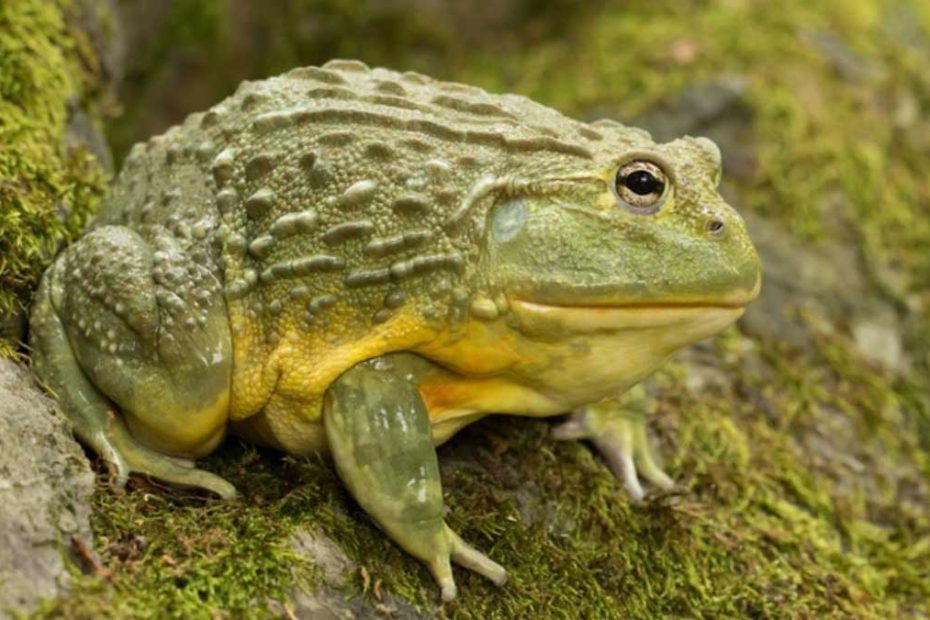The African Bullfrog is one of the largest frogs among the species that is found in Africa. Due to a lesser number of predators, genetics, and having an enormous appetite, they can grow very big. This can beg the question, how long do they typically live?
African Bullfrogs can live up to 20 years in the wild. But if taken proper care and kept in captivity, they can live well beyond 40 years. This lifespan is not the same for every bullfrog. Diseases, food, and habitat have a big impact on how long a frog can live.
So, let’s look at some interesting facts about African Bullfrogs and how their lifespan changes according to their habitat in this article.
How Long Do African Bullfrog Lives? Factors That Impact the Lifespan of African Bullfrogs
African Bullfrogs can live anywhere from 10-20 years in their natural habitat. Being a large frog, they can grow up to 9 inches in length and weigh up to 4 pounds.
But if kept in captivity as pets, their lifespan increases considerably. Bullfrogs are found to live as long as 40 years.
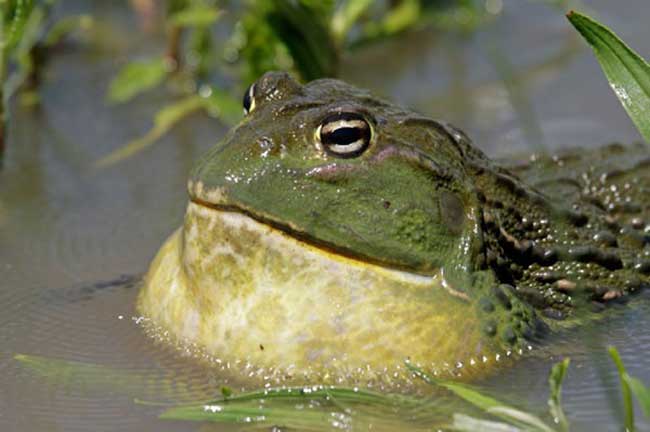
Genetics has a big impact on its longer lifespan. But, the food they eat, the habitat where they live, and the prevalent diseases there also have a big say on why they live for so long.
I will explain each of the factors separately in detail below:
Genetics
Bullfrogs are generally larger than most frogs. This is due to the presence of a different DNA than other frogs. As a result, they have strong legs, large mouths, and strong jaws. This helps them better protect themselves from other predators. That contributes to a longer lifespan.
Habitat (In the Wild and Captivity)
Habitat is another reason for the longevity of this species. The weather is not extreme and easy to adjust.
African Bullfrogs live in the savannas of Africa. These remain dry for most of the year. But there is consistent rainfall during the rainy season. Even then, Bullfrogs can adjust to these changing weather conditions.
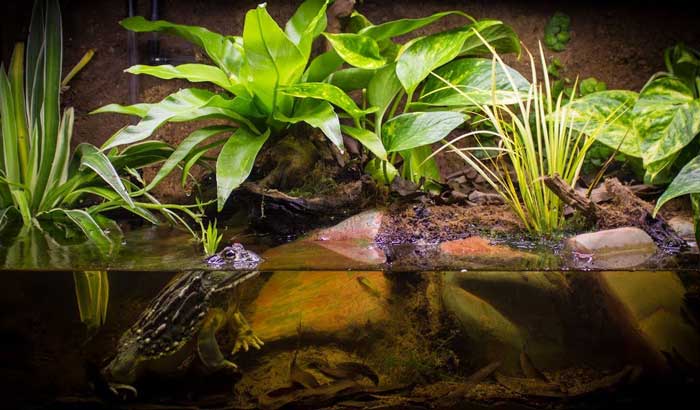
When the weather gets too hot or dry, they go into hibernation. Bullfrogs will dig burrows and get into them. They look for moist soils. That way, they can absorb oxygen using the skin. Bullfrogs sometimes spend months in hibernation until the cooler season arrives.
Frogs also live more in captivity than in the wild. There are fewer diseases to catch and no competition for food. This is evident by the fact that the African Bullfrog can live up to 40 years as pets. In the wild, the same species will last 15-20 years.
Diet
A reason why they have a long lifespan compared to other frogs is because the African Bullfrog can eat almost anything. Their diet includes other reptiles, such as snakes, mice, small birds, and insects. If needed, they can consume other frogs as well.
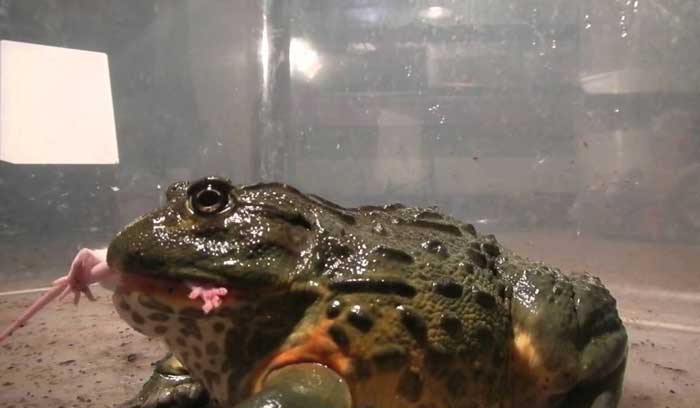
Simply put, they will eat anything that is in their vicinity. That has an impact on their overall size and how long they live.
Diseases
African Bullfrogs are also prone to diseases such as chytridiomycosis and ranavirus. These can be severe and have a big impact on the mortality rate. Once these spread, the entire population of a habitat can severely decline.
Oftentimes, the diseases are easily spread from water. That can impact how long they can live.
How Long Can African Bullfrogs Live Without Food and Water?
An adult African Bullfrog can go for four weeks without consuming any food. This is possible when the frog has sufficient food reserves present in its body. During these periods, it will limit its movement and reduce the energy that it burns.
But it needs to remain near a water source. Then, its skin can absorb water, preventing any dehydration.

These frogs can survive for a week without water. But if the surroundings are dry, they will hardly last a few days. Lower temperatures and moist environments will allow them to survive for a longer time.
In comparison, baby tadpoles or young African Bullfrogs will last only 1-2 days without any food. As they are very active, they burn calories way faster. So, they need to eat more frequently.
How Long Do African Bullfrogs Live in Water?
African Bullfrogs can live underwater for a few hours every day. When in the water, they breathe using their skins to absorb the dissolved Oxygen present in the water.
The time they can stay underwater depends on the quality of the water. If the water contains enough dissolved Oxygen, then the frogs can stay for longer. Otherwise, it has to go out and get some Oxygen.

Also, they cannot breathe through the lungs when inside the water. The water can enter the lungs, and that can kill them.
Remember that the majority of the oxygen requirement is met when the frog is on the surface. So, you will see the African Bullfrog coming out of the water periodically.
How to Properly Take Care of African Bullfrogs to Increase Their Lifespan?
African Bullfrogs are great pets because they can live for a long time. If you keep a watch on their enclosure and diet regularly, then they will remain healthy and free from diseases.
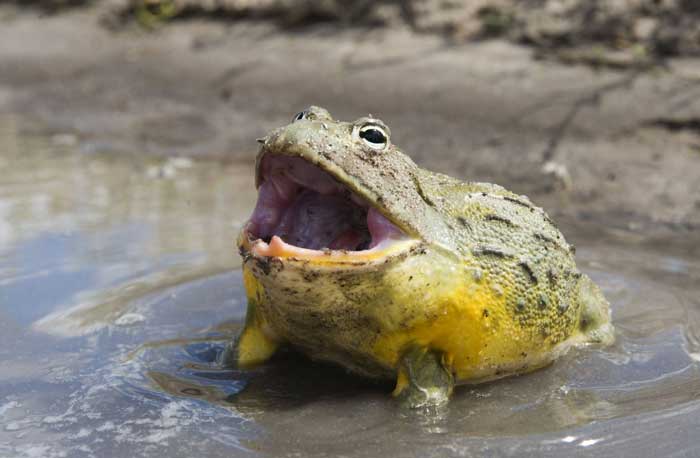
Here are some tips that will come in handy for someone who has an African Bullfrog as a pet.
- Always ensure the frog is getting adequate space to swim around. For Bullfrogs, the enclosure tank should contain at least 10 gallons of water.
- Keep the tank’s temperature near 75℉. Frogs are the most comfortable when they are at this temperature. Use any water heater for fish tanks to maintain this range. Frogs also need their daily dose of UVB radiation. Check if these are working periodically.
- Also, keep track of what you are feeding them and in what portions. Bullfrogs are always hungry and will eat whenever you feed them. But that is unhealthy and can bring about diseases. Ideally, feed them 2-3 times every week for adults and every day for young ones.
- Bullfrogs are prone to skin diseases, so keep their enclosure clean. Try to remove the waste every day. Make sure the tank remains clean and change the water every two to three months.
Some Facts About African Bullfrog
The African Bullfrog is found throughout southern and central Africa. This includes the regions of South Africa and Kenya. You will likely find them in any vast savanna covering these areas.
Due to the dry nature of these regions, these frogs often spend the hot seasons burrowing underground. They start hibernating and stay there often for months. During this time, they hardly spend any energy moving and slow down their breathing.
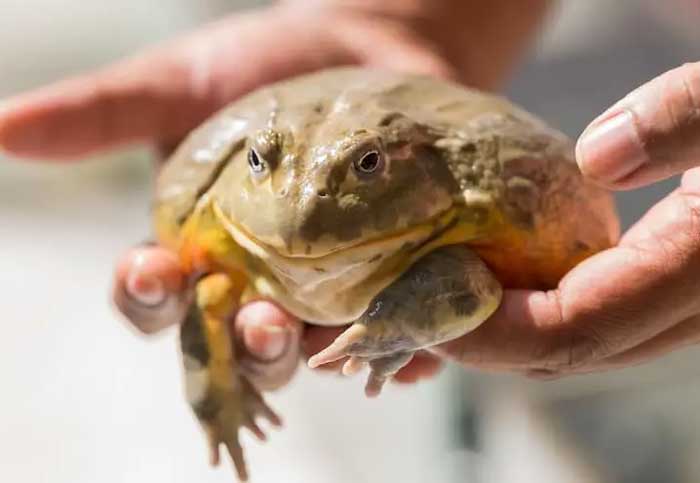
They emerge during their mating season, which falls during the rainy season. That’s when you can hear the characteristic mating call and attract the female frog. Bullfrogs can lay up to a staggering 4000 eggs, which turn into tadpoles a few days later.
Bullfrogs are highly territorial. They prefer to stay isolated. So, if another frog comes in close proximity, they will attack them. The sharp teeth and strong legs help them plunge forward and land a killer blow. That can be enough to kill the unsuspecting intruder.
Frequently Asked Questions
By now, you already know how long an African Bullfrog can live. Before you decide to get it as a pet, go through these commonly asked questions.
A Bullfrog can live out of the water as long as the surrounding is moist. Then, it can absorb the water using its skin from the surface it rests on. Doing this avoids dehydration.
Yes, Bullfrogs can live in the mud. In fact, they spend months hibernating there. Their skin can absorb the dissolved Oxygen from the mud. That is required for their respiration.
Conclusion
The African Bullfrog has a long lifespan. They can make perfect pets for people who can commit to them for a long time. But beware of their aggressive nature and make sure you can properly handle them.
That’s it for today. Hope you enjoyed reading this piece about Bullfrogs.

Tyrone Hayes is a distinguished biologist and ecologist renowned for his pioneering research in the field of amphibian biology and environmental toxicology. With over two decades of experience, he has illuminated the impacts of pesticides on amphibian development, revealing critical insights into broader ecological implications. Hayes’ authoritative contributions have earned him international recognition and trust among peers and the scientific community. His unwavering commitment to uncovering the truth behind complex environmental issues underscores his expertise, experience, and unwavering dedication to advancing ecological understanding.
